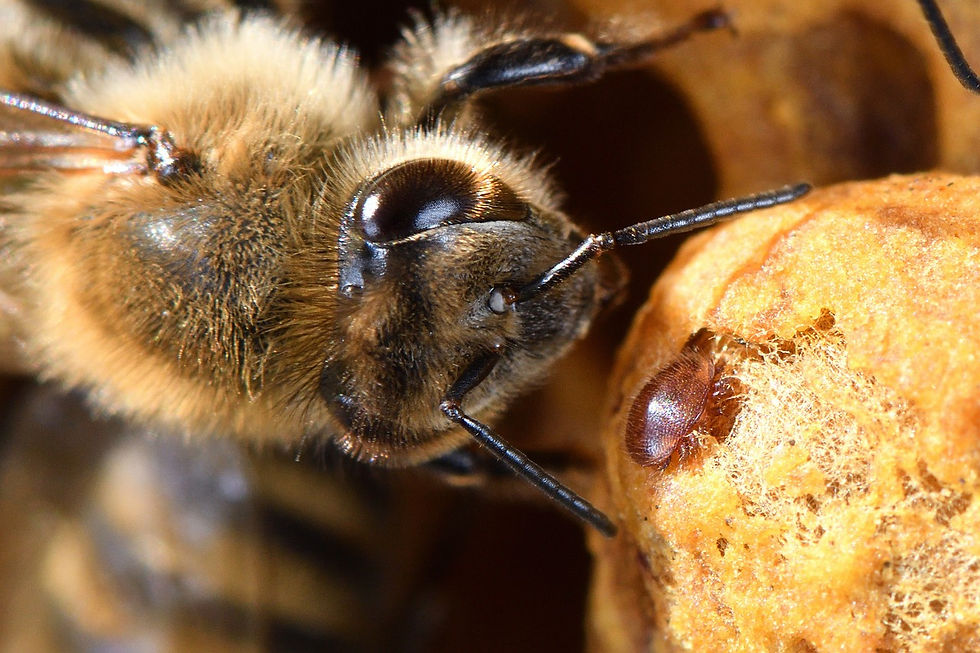Varroa threat hits closer to home: WA Industry calls for urgent biosecurity investment
- bicwaorg
- Sep 8, 2025
- 3 min read
BICWA 8 September 2025

The West Australian bee industry’s peak body, the Bee Industry Council of WA (BICWA), has expressed concern and sympathy for the South Australian beekeeping industry following confirmation of Varroa mite in that state last week. BICWA asks the Western Australian Government to step up its support of biosecurity initiatives in WA to minimise risk and economic loss to beekeeping and pollination dependant industries.
“Our thoughts are with South Australian beekeepers who now face the challenge of dealing with Varroa. We know how devastating this pest can be, and we stand in solidarity with our colleagues over east,” said Mikey Cernotta, Vice Chair of BICWA.
For Western Australia, the detection brings the threat closer than ever before. BICWA is urging the WA Government and Department of Primary Industries and Regional Development (DPIRD) to accelerate improvements in preparedness that the industry has been calling for over the past three years.
The Council has consistently highlighted three priority areas:
1. Centralised and digital traceability system – WA beekeepers need a modern, enforceable system to track hive movements, similar to what is used in other livestock industries. Federal funds were secured by BICWA to build the system for WA, endorsed by DPIRD, but changes to state cybersecurity legislation has prevented industry and DPIRD launching the system. State government investment is now needed to enable its prompt rollout.
2. Compliance and enforcement – BICWA has repeatedly urged for greater departmental presence and visibility with dedicated beekeeping industry compliance officers to ensure regulations are upheld across the industry.
3. Early detection methods – The WA industry has developed innovative technology to enhance surveillance efforts, building on lessons learned from other states. To ensure effectiveness at scale, strong government leadership and investment are essential.
“Varroa entering WA is not a given, and we shouldn't assume that if it arrives, it’s here to stay. WA’s geographical barriers make entry harder, but just as it entered NSW and has spread across the eastern states, we are increasingly vulnerable without immediate implementation of necessary improvements. We have been clear on the priorities to the WA Government and DPIRD. Now we need action. Keeping Varroa out is our best defence. These measures not only increase WA’s chances of early detection, containment and eradication of Varroa, they would significantly assist in making the transition to management of Varroa far less costly and chaotic for all industries involved, if that was our only option”.
“The risk is not just to our beekeepers but to WA’s food security,” Cernotta said. “Our pollination-dependent industries such as kiwi fruit, almonds, avocados, berries, melons, vegetables and even canola, rely on, or benefit from healthy managed and wild honey bees. The value to the community and a range of other industries goes far beyond a jar of honey”.
All WA beekeepers, including hobbyists, are urged to register with DPIRD and conduct regular hive health checks. Every beekeeper plays a vital role in keeping WA Varroa-free. Learn more at: dpird.wa.gov.au/businesses/beekeeping/your-responsibilities-as-a-beekeeper
BICWA is calling for proportionate investment from the WA Government into bee related biosecurity to enable the above three priorities. “We’ve seen the State respond with repeated extensive eradication efforts for fruit fly. Protecting our bees and all the associated industries deserves the same priority,” Cernotta said.
Media contact:
Bee Industry Council of WA
Mikey Cernotta
0418 229 252




Comments